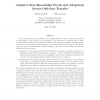21 search results - page 2 / 5 » On Unconditionally Secure Distributed Oblivious Transfer |
TCC
2009
Springer
14 years 5 months ago
2009
Springer
In the setting of secure computation, a set of parties wish to securely compute some function of their inputs, in the presence of an adversary. The adversary in question may be st...
JUCS
2008
13 years 4 months ago
2008
Abstract: Oblivious transfer is an important cryptographic protocol in various security applications. For example, in on-line transactions, a k-out-of-n oblivious transfer scheme a...
CRYPTO
2006
Springer
13 years 8 months ago
2006
Springer
Abstract. We study unconditionally secure 1-out-of-2 Oblivious Transfer (1-2 OT). We first point out that a standard security requirement for 1-2 OT of bits, namely that the receiv...
TCC
2004
Springer
13 years 10 months ago
2004
Springer
Quantum 2-party cryptography differs from its classical counterpart in at least one important way: Given blak-box access to a perfect commitment scheme there exists a secure 1−2...
TCC
2007
Springer
13 years 11 months ago
2007
Springer
Abstract. A (k; n)-robust combiner for a primitive F takes as input n candidate implementations of F and constructs an implementation of F, which is secure assuming that at least k...

